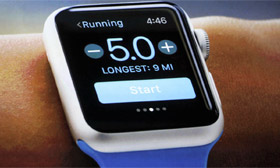
It was already clear the Scottish independence debate was being watched closely in Catalonia, but this writer didn’t realise quite how closely until he posted a tweet of a political cartoon by Kap (Jaume Capdevila) comparing the two situations, which was then furiously retweeted and debated.
And the view from Catalonia #indyref pic.twitter.com/Yj0AMvte7g
— James Walsh (@jamesofwalsh) September 1, 2014
On Thursday hundreds of thousands of people will take part in a V-shaped demonstration in Barcelona, organised by supporters of Catalan independence as a crucial step in emphasising the legitimacy of a vote on self-determination taking place in November - but banned by the Spanish authorities. And Catalans seeking a secession vote are inspired by what they see happening in Britain.
“The UK is willing to let Scotland vote and Catalonia is refused that right by the Spanish,” says Liz Castro, an author and publisher who divides her time between Massachusetts and Barcelona. “Catalans look to the Scotland-UK question with a sense of envy and admiration, they’re constantly talking about the ‘quality of the democracy’ there. Personally, I wonder if it’s a bit romanticized and idealized. But, the truth is that [people in Scotland] all will vote on September 18th, and Catalans are still debating what we will do when they tell us we can’t.”
“If Yes won in Scotland, the Catalan independence movement would become stronger”, says Eulàlia Solé-i-Tomàs, a political scientist from Barcelona. “Spain would be terrified and would increase the pressure on Catalonia as well as strongly emphasise the refusal of the referendum.”
Will this pressure lead to the granting of a secession vote in Catalonia? This scenario doesn’t seem likely from the perspective of Christopher Carnie, Scottish but resident in Catalonia since 1998. “There is very little prospect that Madrid will allow the Catalans to vote in the foreseeable future despite the determination of Artur Mas. The campaigns are, as a result, very different with the Catalans forced to focus on process while the Scots can imagine a new country, and then make that a reality.”
“A Yes vote in Scotland won’t change anything here,” agrees Àlex Sancliment, of the Catalans for Yes campaign. “The Spanish Government will continue saying the Constitution prohibits any consultation or referendum in an autonomous community.”

When asked to compare the cases for Catalan and Scottish independence, Catalan Yes campaigners focused on historical and economic reasons, but also emphasised the cultural differences. “Most Scottish don’t speak Gaelic while almost 50% of the Catalan population (me included) have Catalan as our mother tongue, and almost everybody can speak it,” says Jordi Cruz, a meteorologist from Barcelona. “To be honest, I think Catalans have more reasons to become independent than Scottish have.”
Lluís Viñas Castelló, 23, from Figueres, sees similarities in the campaigns. “They are both non-violent, and they’ve both acquired momentum during the last decade. There wasn’t a mainstream independence movement either in Scotland or Catalonia during the 1990’s. Scots didn’t even have their devolved parliament. And there’s the intention to link social progress to independence. That is, creating a new country to secure a fairer and more just society.”
Robert Rudnicki, from Rugby but resident in Catalonia for the past three years, also sees parallels, if more worrying ones. “If the Yes vote succeeds both nations will be politically independent, but without control over their monetary policy. The Scots have vowed to keep the pound, which may or may not be allowed to happen, but even if they do they have no singular monetary policy, that will still live in London, but without any Scottish voices influencing it.
“For both, EU membership would likely mean reapplying, which could take years, particularly as Spain or the UK can veto.”
But the rhetoric around EU entry is an aspect that attracts derision from some pro-independence quarters. “One of the Spanish government’s threats is that a free Catalonia would be ‘automatically’ tossed out of the EU ‘forever’ and would wander through outer space,” says Michael Strubell, a recently retired university lecturer from Barcelona. “These words were uttered not by a Spanish extreme nationalist or a drunken taxi driver, but by Spain’s minister for foreign affairs.”
“For Catalans, for Scotland to win its independence would be an incredible morale booster,” says Castro. “If it loses, I think people will shake it off and point to the differences. However, the really significant advantage to Scotland going first is that if it wins, the EU will have to act, and countries will begin to recognize it, and then Spain will lose its only weapon: fear.”
















